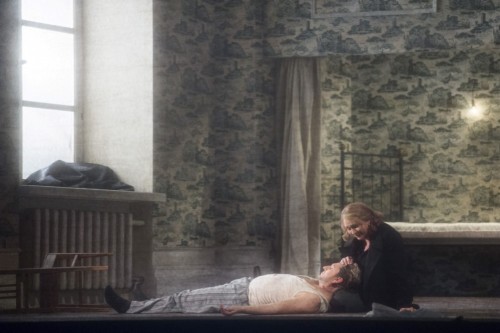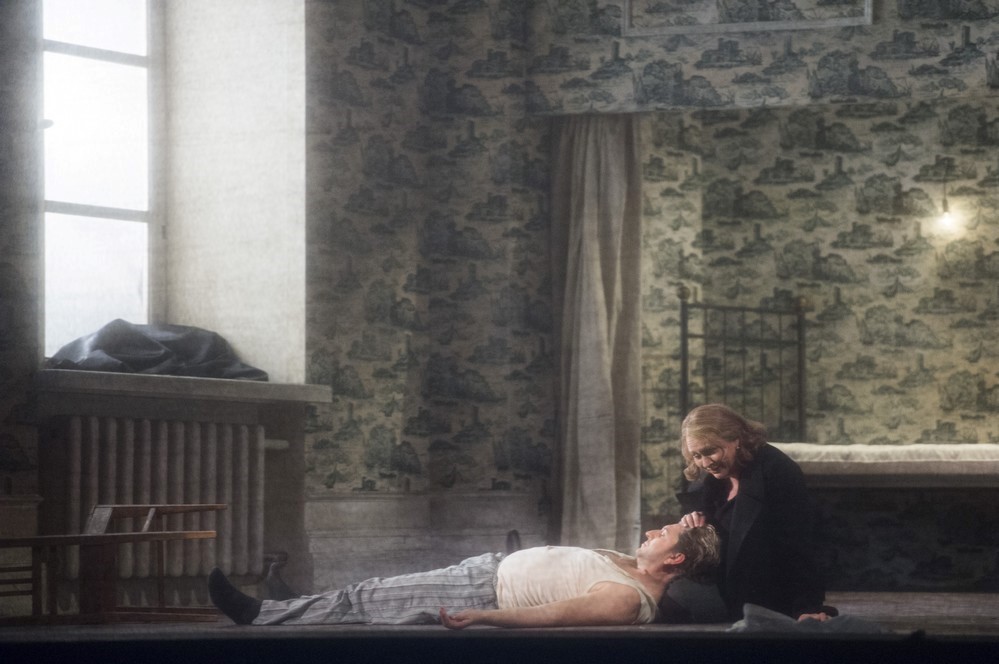 Germany Wagner, Tristan und Isolde: Soloists, Staatsopernchor Berlin, Staatskapelle Berlin / Daniel Barenboim (conductor), Staatsoper Unter den Linden, Berlin, 25.2.2018. (JMI)
Germany Wagner, Tristan und Isolde: Soloists, Staatsopernchor Berlin, Staatskapelle Berlin / Daniel Barenboim (conductor), Staatsoper Unter den Linden, Berlin, 25.2.2018. (JMI)

Cast:
Tristan – Andreas Schager
Isolde – Anja Kampe
King Marke – Stephen Milling
Brangäne – Ekaterina Gubanova
Kurwenal – Boaz Daniel
Melot – Stephan Rügamer
Sailor – Adam Kutny
Shepherd – Linard Vrielink
Production:
Director and Sets – Dmitri Tcherniakov
Costumes – Elena Zaytseva
Lighting – Gleb Filshtinsky
After more than five years renovation, the Staatsoper Unter den Linden in Berlin reopened its doors a few months ago, returning to its headquarters after its exile at the Schiller Theatre. I was curious to see how the theatre, which I have attended in the past, had changed, and the most surprising thing has been the acoustics, which are truly spectacular. That makes it particularly rewarding to listen to opera here – I cannot remember such good sound in my many years of visiting opera houses.
The Staatsoper has presented a new production of Tristan und Isolde by Russian stage director Dmitri Tcherniakov. He seems to have a good relationship with Daniel Barenboim, and has already directed several operas for this company, the most recent being Parsifal.
The action has been moved to current times and the sets, which are also by Tcherniakov, are brilliant at times. The first act takes place in a meeting room on the ship that takes the heroes to England, with a screen where you can follow the progress of the ship. In the second act we are in the palace of King Marke, where a farewell to the hunting-party guests is taking place. In the background, separated by a door, is a large dining table. Act III takes place in a room in Kareol with a sofa where Tristan lies, a cubicle in the background and a window on the left from which the ocean can be seen. Overall, it is a modern and attractive production.
The staging is not excessively ‘original’ in the first two acts. The reaction of our heroes after drinking the love potion is surprising: they almost have an attack of laughter. The entrance of Tristan in Act II presents a somewhat carefree character, and something similar happens with Isolde, although in the love duet things seem to get more serious. For the Kareol act to begin with, the cor anglais player comes out on stage and is placed in the background cubicle until Isolde shows up. For Tristan’s monologue, the parents of the hero appear on stage and his mother is very pregnant. This does not add anything, but it does distract attention from the music. Judging by Tristan’s movements, one would say that he dies of a heart attack: one cannot understand so much thrashing about by a moribund being. Another new Tcherniakov idea is that Kurwenal and Melot do not die, which eliminates any sense from King Marke’s expression when he enters: ‘All dead’. But except for these oddities, the production works well and the stage direction is effective, as it usually is in Tcherniakov’s work.
Daniel Barenboim was in charge of the musical direction, and his conducting was magnificent, drawing a spectacular sound from the excellent Staatskapelle Berlin. It was a real pleasure to attend a performance in this house, since the acoustics turned the sound into something miraculous. It was a great night.
Tenor Andreas Schager was an exceptional Tristan. The ability to overcome the difficulties of the score, especially in the Act II duet and in the immense monologue of the third, is only given to authentic heroes. Andreas Schager is, along with Stephen Gould, the great Tristan of today. He is also a convincing stage performer.
Soprano Anja Kampe was a superb interpreter of the part of Isolde, living it with rare intensity. Her middle voice is perfect, with more than enough amplitude, and she knows how to transmit emotions. But her top notes were tight. It is true that there was a warning of indisposition at the beginning of the performance, but I am afraid that it was only putting on the bandage before the wound took place. In any case, she was a great Isolde.
King Marke was played by Stephen Milling, who gave a solid performance, singing his great monologue of Act II with robust sound and elegance. He is one of the best choices today for these great Wagnerian basses.
Russian mezzo-soprano Ekaterina Gubanova was a magnificent Brangäne. I think it’s the best performance I can remember from her. Although her voice has an undoubted quality, she always left me a bit cold, but this time she was totally convincing.
Good too was the performance of Boaz Daniel as the faithful Kurwenal, with a proper and sonorous voice. In the secondary characters, Stephan Rügamer did well as Melot, as did Adam Kutny in the role of the Sailor. Linard Vrielink as the Shepherd was correct.
The house was fully sold out. The audience gave an enthusiastic reception to the artists, in particular to Daniel Barenboim and the two protagonists.
José M. Irurzun

Having seen it on television (so impressions may be different, of course) I must say I have a different opinion. To my ear, Schager suffers from a wobble (call it an over-broad vibrato if you like), possibly caused by forcing the voice too much. Maybe if he had kept to a less demanding repertoire, he could have looked after his voice better.